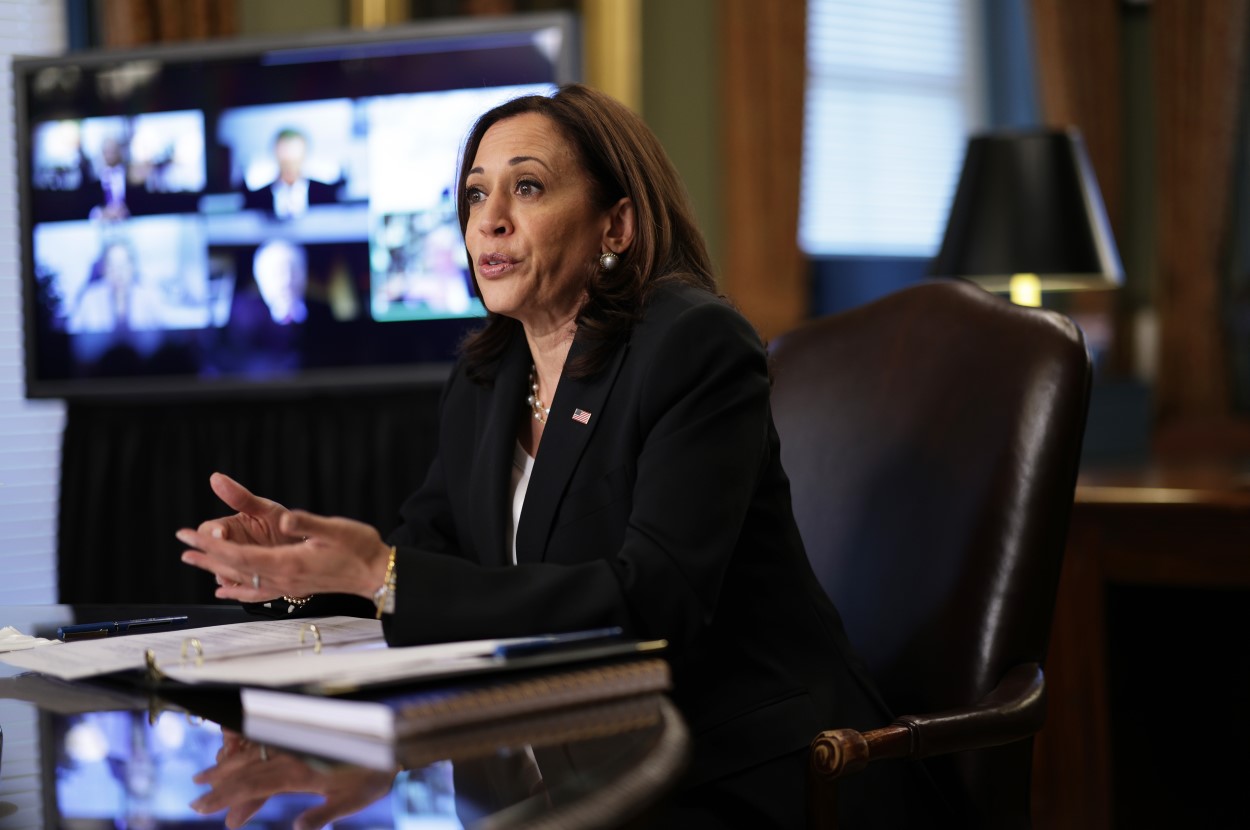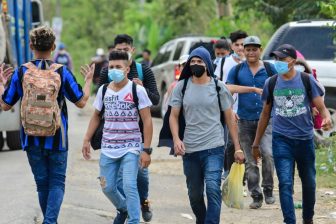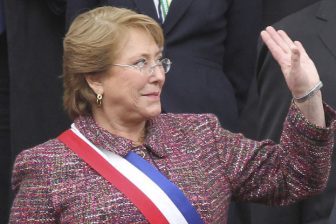The most honest thing yet written about the U.S. border crisis remains a Saturday Night Live skit that aired in March, in which a fictional President Joe Biden tells Vice President Kamala Harris about her new portfolio. “I’m not sure if you’ve heard,” Biden breezily says, “but I’ve put you in charge of solving a little immigration problem down at the Mexican border.” “Yes, I did hear that, wow,” the actress playing Harris replies, with precisely zero enthusiasm. “Thank you for the opportunity – such a fun, solvable problem!”
As the real-life Harris embarks on her first foreign trip to Mexico and Guatemala on June 7-8, it is impossible to know how she really feels about the challenge. The flow of undocumented migrants across the border has continued to rise to 20-year highs, piling pressure on the administration to address the issue at least partly through diplomacy. By all accounts, Harris has prepared extensively, speaking with power brokers and members of civil society. But among Latin American diplomats and other observers, the trip has inspired a certain sense of dread – a feeling that the vice president is embarking on a thankless and perhaps impossible mission. The question is whether her strategy is the right one – or whether the region’s problems are simply, to paraphrase SNL, unsolvable in the foreseeable future.
So far, the Biden administration has opted for a more confrontational approach than its predecessors (including Barack Obama), shining a bright public spotlight on the region’s failures – the “root causes” that lead people to emigrate from Central America’s Northern Triangle, composed of Guatemala, Honduras and El Salvador. These include unemployment, violence, climate change and the COVID-19 pandemic, among others. But the Biden team has placed particular emphasis on corruption, which Harris mentioned 10 times in a speech to AS/COA’s Washington Conference last month. “If corruption persists, history has told us, it will be one step forward and two steps back,” Harris said, a comment that made front page headlines in Guatemala and elsewhere. The Biden team has declared it wants to steer much of its proposed $4 billion, four-year aid program for the Northern Triangle to civil society, avoiding corrupt governments when possible. One White House official denounced a “predatory elite” that stands in the way of progress, while a State Department list of 16 current or former politicians it deems corrupt was published by Congress last month.
There is something admittedly satisfying, even cathartic, about all of this. Anyone who lives in the Northern Triangle, or has worked there, understands how central corruption is to the region’s challenges – and how it has gotten worse in recent years in profoundly frustrating ways. In 2016, I attended an event in Guatemala City at which local business leaders lavished praise on Iván Velásquez and Thelma Aldana, the country’s two most prominent prosecutors, only for some to turn ferociously against them in later years when the investigations threatened their interests. (Aldana is now in exile while Velásquez, a Colombian, was expelled from the country.) Similar dynamics played out in Honduras. The three countries of the Northern Triangle score terribly in Transparency International’s corruption perceptions index – 104th, 149th and 157th in a list of 179 countries. Endemic graft is a major reason why the past half-century of U.S. aid efforts have mostly failed, as recently noted in AQ by former Costa Rican President Luis Guillermo Solís.
The key question though is whether the U.S. can really do much about it – that is, whether pressure from Washington, or any foreign power, can induce sovereign governments to purge corrupt actors and create better institutions. The most optimistic answer is “maybe” – as vice president in 2015, Biden successfully pressured Guatemala’s President Otto Perez Molina not to end the mandate of the CICIG, the UN investigative body that Velásquez headed. But the world appears to have changed since then in important ways. For one thing, Perez Molina ended up in jail as a result, becoming a cautionary tale in the eyes of many regional leaders. But more broadly, Central American governments now seem more comfortable ignoring, or openly defying, Washington than any time I can remember. Four years of Donald Trump gave them a taste of what it’s like to be left mostly alone, so long as they cooperated on migration and drug interdiction. Trump’s presidency also severely undermined the U.S.’ moral standing when it comes to talking about institutions and corruption. Meanwhile, China has emerged as a viable alternate patron that is perfectly willing to ignore bad governance, a lifeline El Salvador has embraced with particular enthusiasm. One is left wondering whether Biden is trying to replay his greatest hits in front of an audience that has irrevocably changed.
What many see taking shape is an adversarial, and possibly counterproductive, dynamic between Washington and the region’s governments – what the Washington Post recently deemed “early roadblocks” in a “fraying” set of relationships. Many of the region’s political and business elites have gone into a defensive crouch, vowing in private not to work with the U.S. at all; everyday Guatemalans, Hondurans and Salvadorans seem more focused on recovering from the pandemic and reducing violence than comparatively ethereal issues like transparency. Yes, it’s still early; Harris, a former California attorney general, may through her impressive record and charisma yet prove capable of pushing for cleaner government while keeping the overall tone constructive. Secretary of State Antony Blinken was also set to meet with regional officials at a conference in Costa Rica this week. But this all feels different from, say, Washington pressuring Colombia to implement its peace deal or Brazil to better protect the Amazon. The alchemy of institution-building is elusive to say the least; trying to impose this process from the outside, even with the best intentions, recalls some of the US’ failed endeavors elsewhere in the world so far in the 21st century.
What then? The Northern Triangle is a subject that has already spawned a thousand policy papers. But I suspect that efforts to pull these countries closer to the U.S., to embrace them instead of shaming them or pushing them away, would end up being more productive for all sides. One idea is to boost trade by inviting Central American countries to join the United States-Mexico-Canada Agreement, the successor to NAFTA, as suggested recently by the Financial Times, my colleague Eric Farnsworth and others. Washington could urgently prioritize the Northern Triangle for vaccine shipments, for reasons of U.S. national security (given migration flows) and geopolitics (to prevent Beijing from making further inroads). The administration could also help try to marshal private investments, building on what Harris announced last week with companies including Microsoft and Mastercard, at a time when “reshoring” supply chains from Asia is on the lips of many, and Central America may have some competitive advantages.
But even if these ideas are executed to their fullest potential – dubious, given the current bipartisan lack of enthusiasm for trade in Washington – they’re unlikely to immediately slow the pace of migration. Development in the Northern Triangle is a true long-term project; if Honduras’ economy continues to grow at its recent average of about 3.5%, it won’t even reach Mexico’s current per-capita gross domestic product until the year 2061. The Biden administration obviously can’t wait that long – but in the meantime, it could take more effective steps to regulate the flow of people. These could include a far greater use of guest worker visas to allow more Central Americans to enter the United States legally and help fill labor shortages in areas like agriculture and services, while simultaneously using tools like E-Verify to ensure that employers stop hiring undocumented migrants, providing them fewer incentives to cross the border without authorization, a humane and sensible policy mix that former U.S. ambassador to Mexico Christopher Landau recently advocated in the New York Times.
In sum, it may be more realistic for the United States to focus on managing the consequences of the Northern Triangle’s troubles, and trying to contribute to long-term development, than attempting to fundamentally change these countries’ nature from the outside. Is this tantamount to letting the bad guys win? Does it reward the same entrenched elites who benefit from the current status quo forcing migrants northward? Maybe. But this is a part of the world where COVID-19 continues to rage unabated; where support for democracy has been slipping for years; where pushing too hard for change may ultimately drive countries into the waiting arms of Beijing; and where a necessary breakthrough against corruption will need to come from the inside. A different U.S. approach may not be “fun,” to quote SNL’s fictional Harris; it may not even be satisfying. But it may be the best today’s Washington can do.








